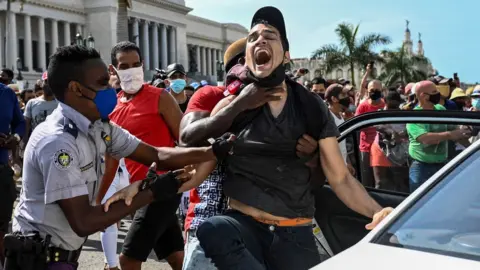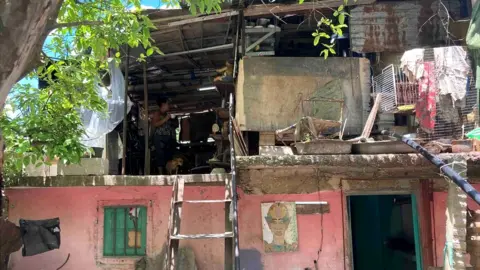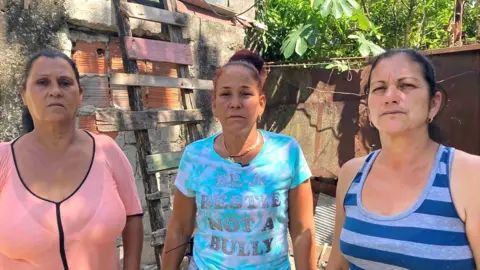Cuba protests: Mothers' trauma over harsh jail sentences
 Getty Images
Getty ImagesWhen thousands of Cubans took to the streets a year ago, the only person to lose their life was killed in La Güinera, a poor and predominantly black neighbourhood on the outskirts of the capital, Havana.
Diubis Laurencio Tejeda, a young black man, was shot by police during the unprecedented anti-government uprising.
After riot police quashed the nationwide protests, around 100 of the 700 people to receive prison sentences also came from the same impoverished area. Many residents, particularly relatives of those who were convicted, believe the state made an example of La Güinera to deter future demonstrations.
"Here in La Güinera, there wasn't any vandalism," says Elizabeth León Martínez, showing mobile phone footage from outside her house which she says backs up her version of events - that the police stormed into the neighbourhood, arresting people at random.
"No-one destroyed patrol cars or broke up stores. Here, there was a response to the police who threw stones and fired shots. All those kids did was run," she says.
Among the hundreds picked up that day were three of her children. At their subsequent trial, they received between six and eight years for sedition - inciting people to rebel against the state.
"Everything [in the trial] was so false. There were 22 kids being tried at the same time. It was like a show, a montage, like theatre. I'm still traumatised by what I saw there," Elizabeth says. "Justice in Cuba doesn't work."

Living conditions in La Güinera are some of the most precarious in Havana. Many residents live in what is known in Cuba as casas de llega y pon - homes built from plastic sheeting, corrugated iron, breezeblocks, wood or whatever is at hand.
Elizabeth lives in one such place, her barefoot grandchildren playing amid scrap metal and rubbish. Already struggling, she must now survive with three fewer incomes to the household as well as looking after their children.
Furthermore, as prison food is near-inedible in Cuba, she must bring each one a food parcel every week to live on behind bars.
"Filling one bag is tough at the moment," she says of the widespread food shortages and rising inflation, "filling three is almost impossible".

The government says many of those who protested last July had been incited to by anti-Castro voices from Washington and Florida. The state claims the jail sentences meted out, which were as long as 25 years in some cases, were proportionate to the supposed crimes.
But international human rights groups and the relatives from La Güinera strongly disagree.
Wilber Aguilar is under such scrutiny from Cuban state security, we had to meet in a park on the other side of Havana.
His son, Walnier Luis, has learning difficulties. Yet in what Wilber says was a sham trial, in which only government witnesses were allowed to testify, his son's condition was not taken into account. Walnier was given 12 years behind bars.
"He was convicted of sedition," says Wilber, incredulous. "How can you imagine that a young black man from La Güinera who barely graduated the ninth grade at a special school could be guilty of sedition? It's all just one big lie."
As we drove around the unpaved roads of La Güinera, I met more family members of convicted young people. Mostly mothers, all of them spoke in low-profile locations to avoid the attention of the authorities.

In each case, they told a similar story: their children had been picked up at random for either peacefully protesting or just filming the event with their phones.
Migdalia Gutiérrez says her son did not even attend the protest, but was mistakenly identified, convicted and then sentenced to 20 years solely on the basis of a grainy photograph of the day.
Catholic youth leader Leonardo Fernández, who lives in the coastal town of Alamar, was also arrested last July for protesting outside the state-run television channel. But he received just six months of house arrest and is convinced the families of La Güinera, whom he supports with donations, were treated more harshly than most.
"It's sad to see 20-year prison terms being handed down to 19-year-old kids. There are cases in which the sentences exceed the length of the convicted person's life. It's a human tragedy, and one which the international community needs to sit up and take notice of."
In other nations, the families might have been able to create a formal 11 July mothers' group, but in Cuba's tightly controlled police state, such non-sanctioned organisations are illegal.
"We've tried to organise but they always stop us," Migdalia says. "We were going to have a meeting of the affected mothers but somehow the state security found out and visited us one by one."
"We don't belong to any group," she insists, fighting back tears, "we're just fighting for our children's freedom."
